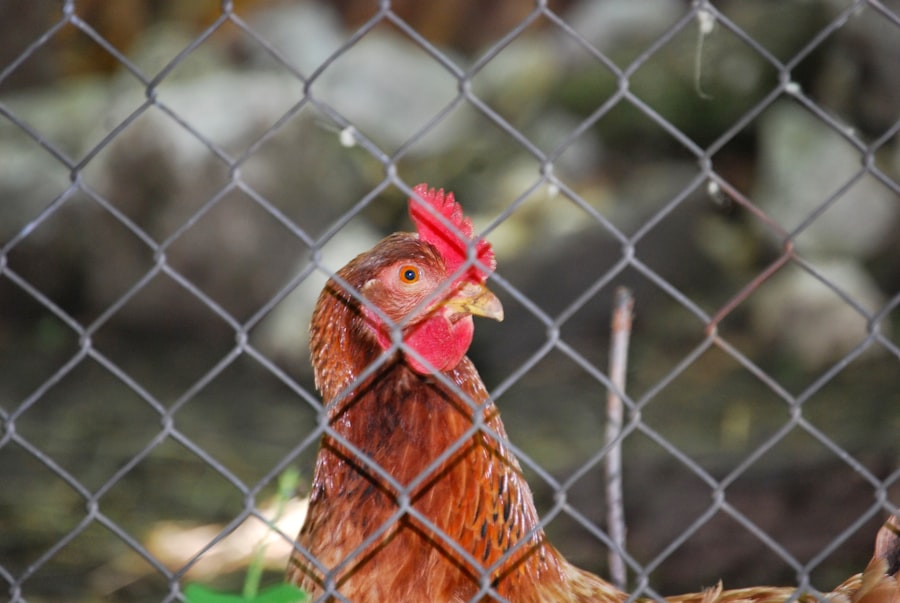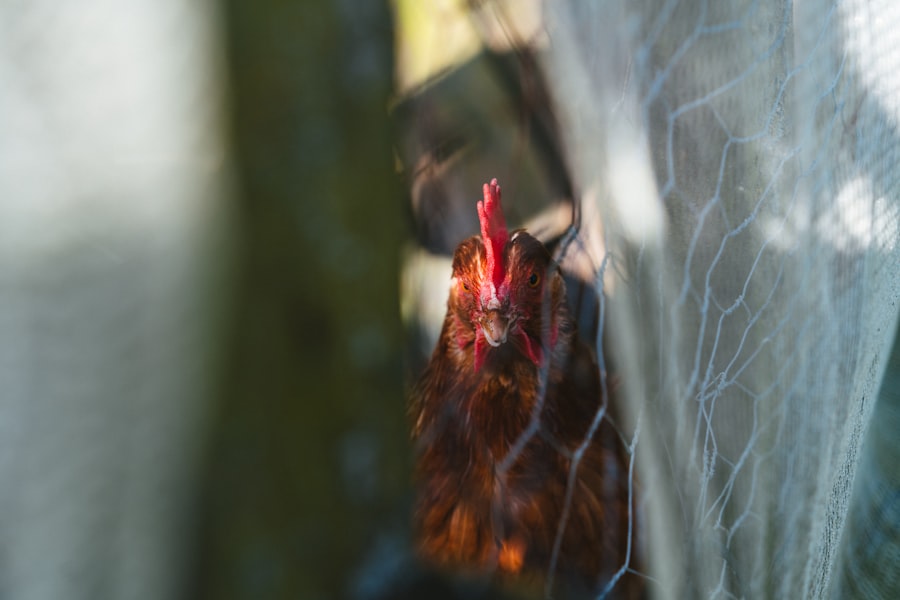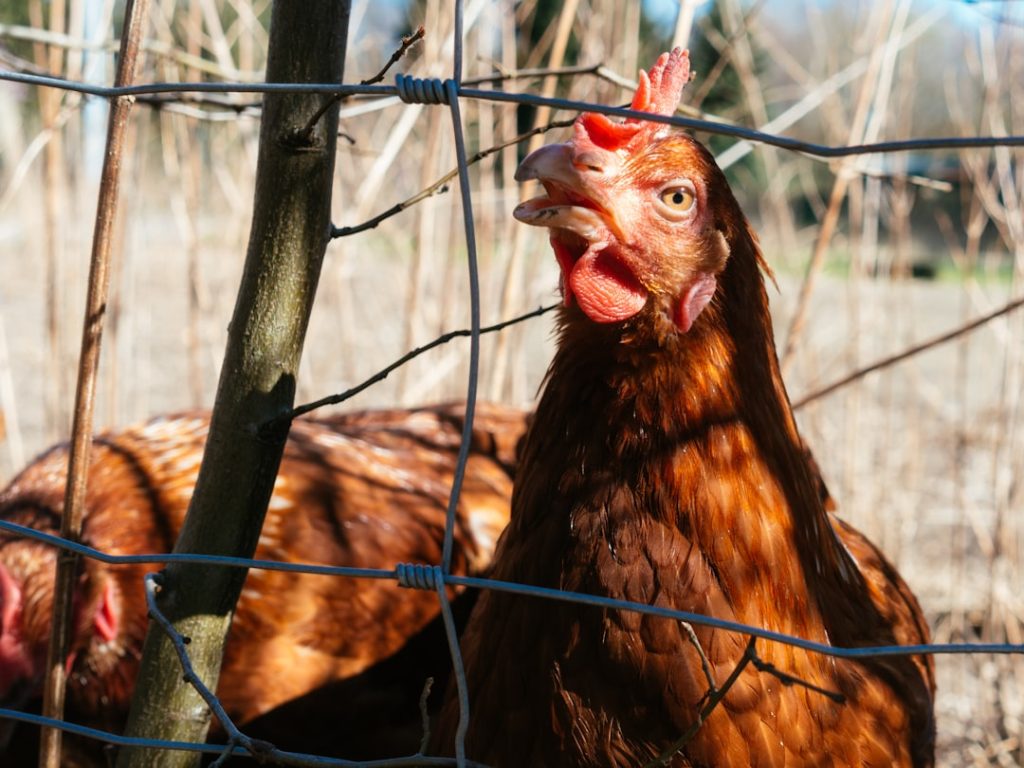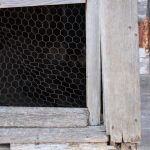Chickens are popular backyard animals that provide fresh eggs and entertainment for their owners. However, they can pose challenges when they enter vegetable gardens. Chickens have a natural instinct to scratch and peck at the ground, which can damage or destroy plants, especially during the growing season when vegetables are most vulnerable.
They are also attracted to insects commonly found in gardens, further exacerbating the issue. Understanding these behaviors is essential for developing effective solutions to protect vegetable gardens from chicken-related damage. Chickens are inherently curious and exploratory animals.
They are drawn to the lush vegetation and potential food sources that vegetable gardens offer. Their strong foraging instinct drives them to search for food in these areas, which can quickly lead to significant damage if left unchecked. It is important to note that this behavior is not malicious but rather a natural instinct for chickens.
Gardeners who understand the motivations behind chicken behavior can implement proactive measures to prevent damage to their vegetable gardens while still enjoying the benefits of keeping chickens.
Table of Contents
- 1 Creating Physical Barriers: Fences and Netting
- 2 Natural Deterrents: Plants and Scents
- 3 Training and Behavior Modification for Chickens
- 4 Providing Alternative Space for Chickens
- 5 Utilizing Chicken-Resistant Vegetables and Plants
- 6 Seeking Professional Help: Consulting with a Poultry Expert
- 7 FAQs
- 7.1 Why should I keep chickens out of my vegetable garden?
- 7.2 How can I keep chickens out of my vegetable garden?
- 7.3 What are some plants that chickens are known to avoid?
- 7.4 Are there any benefits to having chickens in the garden?
- 7.5 What are some alternative ways to incorporate chickens into the garden without causing damage?
Key Takeaways
- Chickens can cause damage to vegetable gardens by scratching and eating plants
- Fences and netting can be effective physical barriers to keep chickens out of the garden
- Certain plants and scents can act as natural deterrents to keep chickens away from the garden
- Training and behavior modification techniques can be used to discourage chickens from entering the garden
- Providing alternative space for chickens to roam and forage can reduce their interest in the vegetable garden
- Some vegetables and plants are less appealing to chickens and can be used in the garden
- Consulting with a poultry expert can provide valuable insights and solutions for dealing with chickens in the vegetable garden
Creating Physical Barriers: Fences and Netting
Fences: A Permanent Solution
One of the most effective ways to keep chickens out of the vegetable garden is by creating physical barriers such as fences. Fences can be constructed around the perimeter of the garden to prevent chickens from gaining access to the plants. It is important to ensure that the fence is tall enough to prevent chickens from flying over it, and that it is buried deep enough into the ground to prevent them from digging underneath it.
Netting: A Versatile Option
Additionally, adding a roof or netting over the garden can further deter chickens from entering. This can be particularly effective for keeping out not only chickens but also other pests such as birds and rodents. Netting can also be used as a temporary solution to protect specific plants or areas of the garden.
Temporary Protection with Netting
By draping netting over individual plants or rows, gardeners can prevent chickens from reaching them without having to construct a permanent fence. This can be particularly useful for protecting newly planted seeds or delicate seedlings. When using netting, it is important to ensure that it is securely fastened and does not pose a risk of entanglement for the chickens.
Effective Protection for Your Garden
By creating physical barriers, gardeners can effectively protect their vegetable garden from the destructive behavior of chickens.
Natural Deterrents: Plants and Scents

In addition to physical barriers, natural deterrents can also be used to keep chickens out of the vegetable garden. Certain plants are known to repel chickens due to their strong scent or taste. For example, planting aromatic herbs such as lavender, mint, or rosemary around the perimeter of the garden can help deter chickens from entering.
These plants emit strong scents that are unpleasant to chickens and can help keep them at bay. Additionally, certain plants such as marigolds are known to have natural insect-repelling properties, which can help reduce the attraction of chickens to the garden. Another natural deterrent that can be used is the use of strong scents or flavors that are unappealing to chickens.
For example, sprinkling cayenne pepper or garlic powder around the perimeter of the garden can help deter chickens from entering. These strong scents and flavors are unpleasant to chickens and can help discourage them from exploring the garden. It is important to reapply these deterrents regularly, especially after rain or watering, to ensure their effectiveness.
By utilizing natural deterrents, gardeners can create an environment that is unappealing to chickens and reduce the likelihood of them causing damage to the vegetable garden.
Training and Behavior Modification for Chickens
Training and behavior modification techniques can also be used to discourage chickens from entering the vegetable garden. Chickens are intelligent animals and can be taught to associate certain behaviors with negative consequences. For example, using a loud noise such as a whistle or clapping when chickens approach the garden can startle them and create a negative association with entering that area.
Over time, this can help deter chickens from entering the vegetable garden altogether. Another technique that can be used is positive reinforcement training. By providing treats or rewards when chickens stay away from the garden, they can learn to associate staying out of that area with positive experiences.
This can be particularly effective when combined with physical barriers and natural deterrents. Consistency is key when using training and behavior modification techniques, and it may take time for chickens to learn new behaviors. However, with patience and persistence, it is possible to train chickens to stay out of the vegetable garden and reduce the risk of damage to plants.
Providing Alternative Space for Chickens
One reason why chickens may be drawn to the vegetable garden is because they are seeking food or entertainment. By providing alternative space for chickens to forage and explore, gardeners can help reduce their interest in the vegetable garden. Creating a designated area for chickens with access to fresh grass, insects, and other natural elements can help satisfy their natural instincts and reduce their desire to enter the vegetable garden.
In addition to providing alternative space for chickens, ensuring that they have a balanced diet and access to enrichment activities can also help reduce their interest in the vegetable garden. Chickens that are well-fed and mentally stimulated are less likely to seek out additional sources of food or entertainment in the garden. By meeting their basic needs and providing a stimulating environment, gardeners can help reduce the likelihood of chickens causing damage to their vegetable garden.
Utilizing Chicken-Resistant Vegetables and Plants

Planting Chicken-Resistant Vegetables
One effective strategy for managing chickens in the vegetable garden is to focus on planting vegetables and plants that are less attractive to them. Certain vegetables and plants are known to be more resistant to damage from chickens due to their taste, texture, or scent. For example, vegetables with strong flavors such as onions, garlic, and hot peppers are less likely to be targeted by chickens.
Using Physical Barriers
Additionally, plants with prickly or tough foliage such as squash or kale are also less appealing to chickens. In addition to selecting chicken-resistant vegetables and plants, using raised beds or containers can also help protect vulnerable plants from chicken damage. By elevating plants off the ground, it becomes more difficult for chickens to access them and cause damage.
The Benefits of Raised Beds
Raised beds also provide better drainage and soil quality for growing vegetables, making them a practical solution for protecting the garden from chicken interference.
Seeking Professional Help: Consulting with a Poultry Expert
If all else fails, seeking professional help from a poultry expert can provide valuable insights and guidance on managing chickens in the vegetable garden. Poultry experts have extensive knowledge and experience working with chickens and can offer practical solutions tailored to specific situations. They can provide advice on effective management techniques, suitable deterrents, and strategies for creating a harmonious environment for both chickens and vegetable gardens.
Poultry experts can also offer recommendations on chicken breeds that are less likely to cause damage to gardens or provide guidance on managing specific behavioral issues in chickens. By consulting with a poultry expert, gardeners can gain a deeper understanding of chicken behavior and develop effective strategies for protecting their vegetable gardens. In conclusion, managing chickens in the vegetable garden requires a combination of proactive measures including physical barriers, natural deterrents, training and behavior modification, providing alternative space for chickens, utilizing chicken-resistant vegetables and plants, and seeking professional help when needed.
By understanding the motivations behind chicken behavior and implementing appropriate strategies, gardeners can create a harmonious environment where both chickens and vegetable gardens can thrive.
If you’re looking for ways to keep chickens out of your vegetable garden, you may want to check out this article on chicken coop options in Grand Island, NE. It offers valuable insights into how to properly house and contain your chickens to prevent them from wandering into your garden and causing damage to your crops.
FAQs
Why should I keep chickens out of my vegetable garden?
Chickens can cause damage to vegetable gardens by scratching up plants, eating young seedlings, and disturbing the soil. They can also spread diseases and parasites to the plants.
How can I keep chickens out of my vegetable garden?
You can keep chickens out of your vegetable garden by using physical barriers such as fences or chicken wire. You can also use natural deterrents such as planting strong-smelling herbs or using motion-activated sprinklers.
What are some plants that chickens are known to avoid?
Chickens are known to avoid plants with strong scents or flavors such as garlic, onions, and herbs like rosemary and thyme. They also tend to avoid plants with tough or prickly leaves such as squash and cucumbers.
Are there any benefits to having chickens in the garden?
Chickens can provide benefits to the garden such as natural pest control by eating insects and weeds. Their droppings can also be used as fertilizer for the plants.
What are some alternative ways to incorporate chickens into the garden without causing damage?
You can incorporate chickens into the garden by creating designated areas for them to forage and scratch, such as a chicken tractor or a fenced-off section of the garden. You can also use their droppings as compost for the plants.
Meet Walter, the feathered-friend fanatic of Florida! Nestled in the sunshine state, Walter struts through life with his feathered companions, clucking his way to happiness. With a coop that’s fancier than a five-star hotel, he’s the Don Juan of the chicken world. When he’s not teaching his hens to do the cha-cha, you’ll find him in a heated debate with his prized rooster, Sir Clucks-a-Lot. Walter’s poultry passion is no yolk; he’s the sunny-side-up guy you never knew you needed in your flock of friends!







